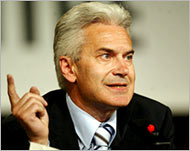Low turnout forces Bulgarian runoff
Bulgarians have voted in an election expected to hand Georgi Parvanov, the president, a second five-year term, but exit polls showed a low turnout had forced a runoff against a defiant nationalist.

Two polls published for national television showed between 39 and 41 per cent of eligible voters had cast ballots. Under Bulgarian law, 50 per cent must vote or the top two candidates must contest another vote the following Sunday.
Results for individual candidates will be published after an embargo on the data expires at 1630 GMT.
Former communist
Parvanov, former head of the ex-communist Socialist party, has won admiration from many in the Black Sea country of 7.8 million for raising its profile abroad on the way to joining the Nato alliance in 2004 and the EU on January 1.
 |
|
Siderov is known for his stance |
An October 19 survey by the state polling agency NPOC indicated the 49-year-old historian had 50.5 per cent support.
The nationalist Volen Siderov, who is known for his hard-line policies against Bulgaria’s minorities – especially Gypsies and Turks – came second with 23 per cent.
In third, with 18 per cent, was the most popular candidate from Bulgaria‘s fragmented right-of-centre opposition, former constitutional court head Nedelcho Beronov.
First mandate
“I voted for Parvanov because he had a very successful first mandate and he will continue that trend,” said pensioner Tsvetanka Botcheva, 65. “He has taken us into Nato and the European Union.”
Although he casts himself as non-partisan, experts say if Parvanov wins, it will help consolidate power for his ruling Socialist allies as the Black Sea country joins the EU.
Analysts say he has used his limited powers, which include the ability to veto laws and appoint cabinets, to become one of the country’s most influential figures.
His critics say he has failed to push successive cabinets to stop high-level corruption and organised crime and raise living standards that – with average wages of 160 euros ($202) a month – will be the EU’s lowest.